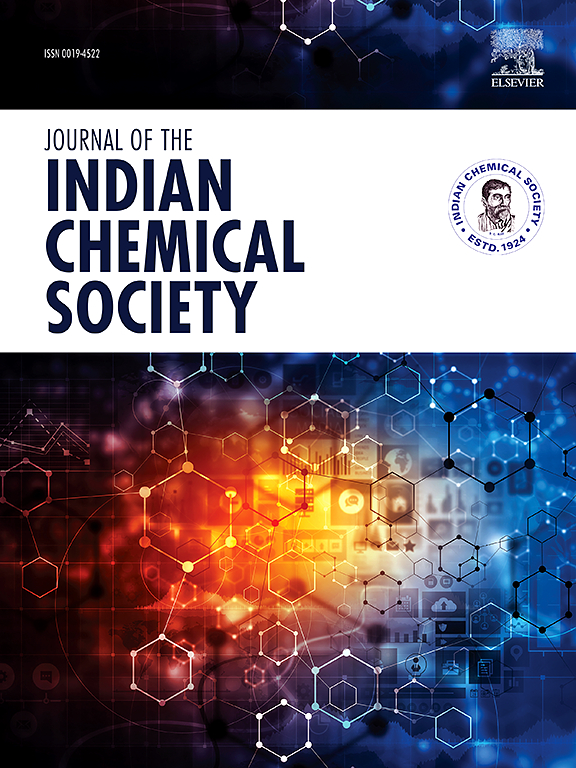肉眼检测阴离子:基于二腙受体的视觉传感
IF 3.2
4区 化学
Q2 CHEMISTRY, MULTIDISCIPLINARY
引用次数: 0
摘要
在这项研究中,我们设计并合成了一种新型的氟离子比色传感器,它将噻吩二甲酰肼框架与水杨醛整合在一起,形成了独特的双甲酰肼-苯酚受体。这种传感器在非水环境中对氟离子和醋酸离子具有极高的选择性,肉眼可见。与氟离子相互作用时,受体的紫外-可见吸收光谱会发生显著的红色偏移,从 332 纳米到 380 纳米的吸收最大值,这表明发生了识别事件。醋酸离子也引起了类似的移动。乔布斯图显示,氟离子与受体离子形成 1:1 的复合物,而醋酸离子与受体离子形成 1:2 的复合物。1H NMR 滴定法进一步证实了受体与离子之间存在氢键相互作用。该受体与醋酸离子的结合常数为 5.2 × 10⁴ M-2,与氟离子的结合常数为 1.6 × 10⁴ M-1,显示了其强大的选择性亲和力。荧光滴定进一步证实了受体作为化学传感器的潜力,在氟离子和醋酸离子存在时,受体会出现明显的发射变化。这项研究不仅强调了该受体在非水体系中对氟离子进行视觉检测的能力,还为其在各种分析和环境环境中的应用铺平了道路。本文章由计算机程序翻译,如有差异,请以英文原文为准。
Naked eye detection of anions: Dihydrazone receptor-based visual sensing
In this study, we designed and synthesized a novel colorimetric sensor for fluoride ions by integrating a thienodicarbohydrazide framework with salicylaldehyde, resulting in a unique bis-hydrazone-phenol receptor. This sensor exhibited exceptional selectivity for fluoride and acetate ions in nonaqueous environments, with detection visible to the naked eye. Upon interaction with fluoride ions, the receptor underwent a significant red shift in its UV–Visible absorption spectrum, moving from an absorption maximum at 332 nm–380 nm, signalling the recognition event. Acetate ions induced a similar shift. The binding interactions were thoroughly investigated, with a Jobs plot revealing a 1:1 receptor-anion complex formation with fluoride ions and a 1:2 complex with acetate ions. Further validation came from 1H NMR titration, which confirmed the presence of hydrogen bonding interactions between the receptor and the ions. The receptor demonstrated remarkable binding constants of 5.2 × 10⁴ M−2 for acetate and 1.6 × 10⁴ M−1 for fluoride ions, highlighting its strong and selective affinity. Fluorescence titrations further confirmed the receptor's potential as a chemo sensor, showing distinct emission changes in the presence of fluoride and acetate ions. This study not only underscores the receptor's capability for visual detection of fluoride ions in non-aqueous systems but also paves the way for its application in diverse analytical and environmental settings.
求助全文
通过发布文献求助,成功后即可免费获取论文全文。
去求助
来源期刊
CiteScore
3.50
自引率
7.70%
发文量
492
审稿时长
3-8 weeks
期刊介绍:
The Journal of the Indian Chemical Society publishes original, fundamental, theorical, experimental research work of highest quality in all areas of chemistry, biochemistry, medicinal chemistry, electrochemistry, agrochemistry, chemical engineering and technology, food chemistry, environmental chemistry, etc.

 求助内容:
求助内容: 应助结果提醒方式:
应助结果提醒方式:


